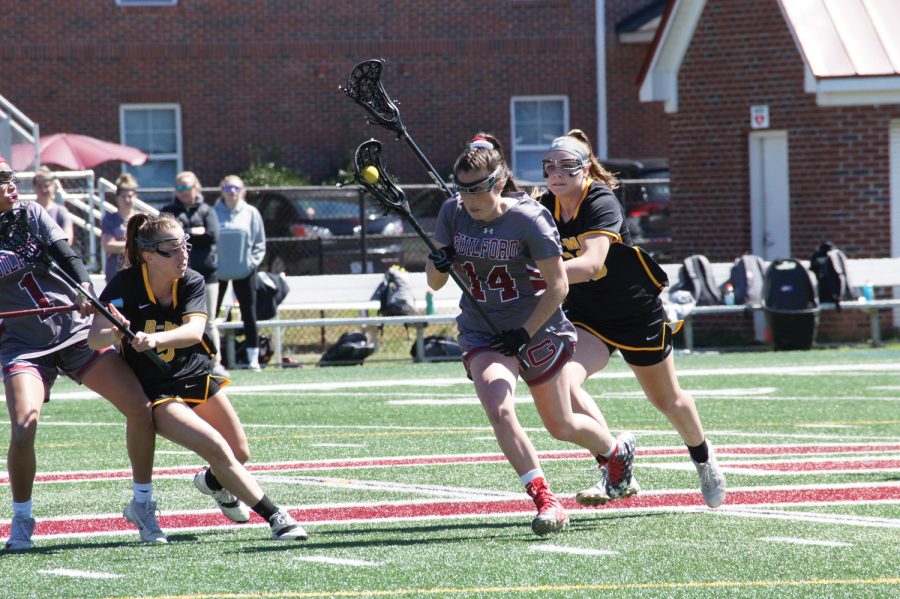Begun in the middle of a tumultuous time both for Guilford College and the nation, the organizing efforts of Integrity for Guilford have changed the way the conversation about social justice on campus.
Integrity is an organizing group run by students and focused on making change in how the College addresses oppression by challenging campus policies and norms. Members highlight that their work is in organizing, not just activism.
“Anyone can go out to a rally and protest for a day,” said Integrity organizer and senior Najha Zigbi-Johnson, who was a founding member of the group. “I think organizers are folks who take time to learn about how to build sustainable movements.”
During Fall 2015, Integrity formed in the wake of Black Lives Matter week on campus when the administration, according to the group, erased the contributions of students Teresa Bedzigui ’16 and senior Brandee Craig, who brought Black Lives Matter co-founder Patrisse Cullors to campus to speak. The original rallies were also¬ connected with student protests over racism at the University of Missouri, which spread to many other campuses across the country.
Known last year for orchestrating rallies and a list of demands focused mostly on anti-black racism within the College, the group is branching out further this year.
“Since (last fall) … we’ve kind of been called in and humbled by our community members with, like, ‘what about trans issues?’ and ‘what about indigenous peoples issues?’ and ‘what about undocumented people’s issues?’” said Integrity organizer and senior Phoebe Hogue-Rodley. “Honestly, some of it didn’t even cross our minds.”
As a result, this year, a major focus is on intersectionality, or addressing the ways that all forms of oppression are connected, as well as coalition-building with other organizations on campus, such as Hispanos Unidos de Guilford and Pride.
“Integrity for Guilford is really actively working to be a multi-issue coalition, and so a lot of students feel like they stand with Integrity, or the work they do falls under the banner of Integrity,” said Zigbi-Johnson. “So this practicum was created in an effort to institutionalize the work and knowledge that were doing and to ensure that students and faculty members are compensated by credit for the work that we do for the school and for one another.”
The Organizing for an Anti-Oppressive Campus practicum, open to anyone in the community, aims to compensate student organizers for their emotional labor. It was formed by Zigbi-Johnson, Noah McDonald ’16 and senior Olivia Chalkley, who also helped found Integrity.
Aside from the success of the practicum, the organizers have many hopes for the future.
“A demand that I would like to see come to fruition soon is adding a sovereign office of diversity and inclusion,” said Hogue-Rodley. “Having that presence, like a director of that office be able to be present at these big meetings or in Jane’s cabinet, and that voice always being there … it’s something that our school really lacks and is behind in.”
Other goals include divestment and working toward a living wage for all campus employees. The organizers also want to make sure their work continues after they graduate.
“I think it’s imperative to make sure that the knowledge that we have, the access to people and knowledge and resources is spread amongst students, and that after we as upperclassmen leave, underclassmen have the tools to engage in liberatory praxes,” said Zigbi-Johnson.
This year, Integrity will advocate for community members, both students, of many identities, including students with disabilities, undocumented students, indigenous students, LGBTQA+ students and students of color. Their coalition seeks includes clubs within the Multicultural Education Department as well as other organizations like Sexual Assault Awareness, Support & Advocacy and the Quaker Leadership Scholars Program. They will not just hold rallies, but will seek to educate and make change in all areas of the campus.
“What we heard a lot of last year was that we were divisive, because we’re calling attention to difference as opposed to … pretending that these things aren’t happening,” said Chalkley. “I think it’s important for everyone to know that we really love this place and love all that it’s given us, and we wouldn’t be able to do the work that we’re doing without the language and the education that Guilford’s given us.”
Integrity for Guilford meets at 8:30 every Sunday in the Multicultural Resources Center in King Hall.








